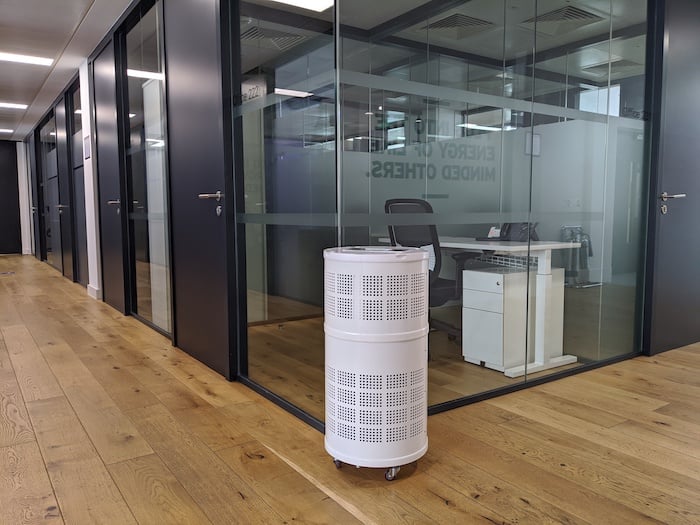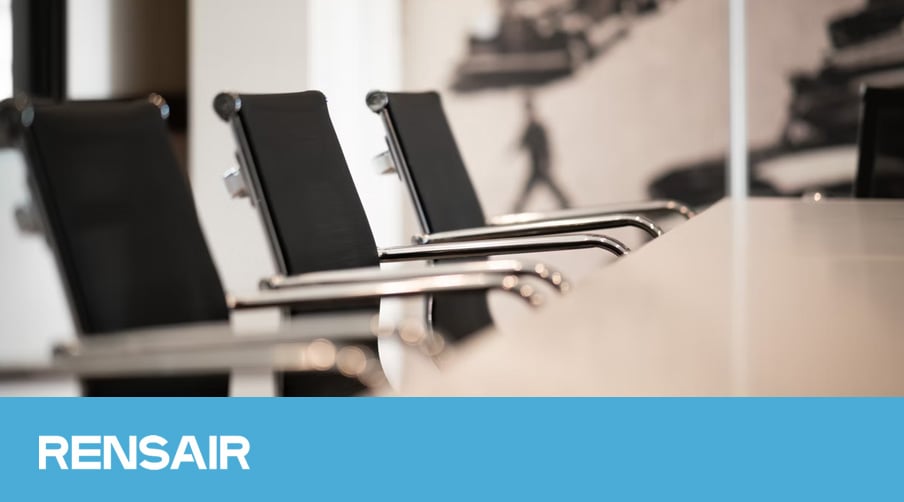Rensair, a patented, portable air purification system, employs both HEPA filter and U-VC light technology. This content is provided by Rensair to provide you with their expert insights on air purification.
Air purification, how can it be utilized?
The coronavirus pandemic has sent shock waves through the business community. The lockdown is forcing many businesses to shut their doors, and infection control dominates the conversation. Everyone is eager to understand how to mitigate the spread of COVID-19.
As we know, scientists have found evidence that airborne aerosols transmit the coronavirus1. This has led to social distancing, regular use of hand sanitizer and the temporary closure of ordinarily overflowing indoor spaces. For some industries such as hospitals, schools and more, closing is not always an option.
This unprecedented event has businesses searching for methods to make their air quality safer and cleaner. The first step is, of course, monitoring the air. By doing so, you can understand which areas in your building have elevated airborne virus transmission risk. Different areas might need different approaches. After collecting data, you can plan preventive measures.
One solution is to explore how air-cleaning technology can improve air quality. 
Scientific evidence
A November 2020 report from the Scientific Advisory Group for Emergencies (SAGE), which provides scientific and technical advice to support government decision-makers during emergencies, addressed the ability of air cleaning devices to manage the spread of COVID-192.
The study tested a variety of air-purifying technologies3. They found it encouraging that air-purifying technology could be effective. The benefits varied according to the underlying technology, design, noise, location, and maintenance of the device. They advise individuals to ask the manufacturer for test data to substantiate the efficacy and safety of their particular system.
The report says systems based on HEPA filtration and germicidal U-VC technologies are likely to be effective against coronavirus transmission4. They specifically found that HEPA filter devices could remove the size particle responsible for the coronavirus. In addition, this high-efficiency system poses low risks, has no emissions, and is safe to use. They also determined that enclosed germicidal U-VC technology could also be effective as it inactivates microorganisms by damaging their RNA/DNA. 
Safe and effective
This information is a plus for businesses looking to educate themselves on how they can best mitigate the spread of the coronavirus in their establishments. Armed with the recommendation that some effective air purifying systems employ HEPA filtration and germicidal U-VC technology, businesses are better equipped to find an air purifying system that can be safe and effective.
Rensair, a patented, portable air purification system, employs both HEPA filter and U-VC light technology. Leading laboratories have tested Rensair, including Eurofins, Norconsult and Oslo University Hospital, and shown that Rensair is over 99.97% effective at removing airborne impurities such as viruses and bacteria including the coronavirus. Learn more about Rensair. www.rensair.com
 Sources:
Sources:
1. https://www.bmj.com/content/370/bmj.m3206
2. https://www.gov.uk/government/publications/emg-potential-application-of-air-cleaning-devices-and-personal-decontamination-to-manage-transmission-of-covid-19-4-november-2020
3.https://assets.publishing.service.gov.uk/government/uploads/system/uploads/attachment_data/file/928720/S0789_EMG_Role_of_Ventilation_in_Controlling_SARS-CoV-2_Transmission.pdf
4.https://assets.publishing.service.gov.uk/government/uploads/system/uploads/attachment_data/file/928720/S0789_EMG_Role_of_Ventilation_in_Controlling_SARS-CoV-2_Transmission.pdf
 Most popular
Most popular
 NEW
NEW




 Radon
Radon
 Radon
Radon



 Sources:
Sources: